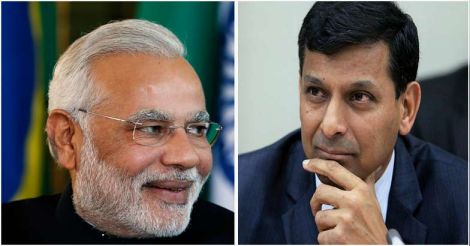The talk of the town in Delhi is all about whether the Narendra Modi dispensation will offer a second term for Raghuram Rajan, the widely admired and fiercely independent governor of the Reserve Bank of India. The prime minister has been very secretive on his decisions about key postings, at times even springing surprises. Rajan, appointed by Manmohan Singh, completes his three-year term in August, and had resisted pressure from finance minister Arun Jaitley to slash interest rates.
During the two years of NDA government, Rajan urged the government to take strong measures for reducing inflation and curbing government expenditure. Rajan also ignored a chorus from the industrialists to reduce the interest rates, citing the argument that only lower interest rates will spur growth.
But the governor cracked down on banks, which were hiding enormous amounts of bad loans, and asked them to clean up their balance sheets.
Maverick BJP leader Subramaniam Swamy has sought the dismissal of Rajan, by unleashing a series of wild allegations.
Swamy charged that Rajan was not loyal to the country, but instead was pursuing an agenda to promote US interests. He also charged that Rajan was choking small and medium industries through his policies. But finance minister Arun Jaitley, who is a close confidant of Modi, has backed the RBI governor.
Modi has had a balanced approach on officials who had been appointed by the Manmohan Singh government. He had prevented his ministers from appointing officers and even clerks who had worked for UPA ministers.
But Modi gave two extensions to Ajith Seth, the cabinet secretary who is the head of the civil service, though Modi himself had accused the Manmohan Singh government of policy paralysis.
Modi figured out that Seth was sound in handling files and offering different options to the prime minister. Seth got a post retirement sinecure as well. Another instance was of high profile regulator U. K. Sinha, chairman of the Securities and Exchanges Board of India (SEBI), who had cracked down on dubious listed companies.
When Sinha was about to retire last year, several high profile candidates, including those had served the SEBI and the finance ministry in key positions eyed the post. There were feelers from even top dignitaries. One applicant was well connected with the BJP, but Modi surprised everyone by giving an extension to Sinha as he felt that he had succeeded in restoring credibility, even though he was a carry-over of the UPA government.
Similarly the Indian Administrative Service had monopolised the Chief Vigilance Commissioner's post for decades. The CVC vets the integrity and character of top officials, and checks flaws in the government system to curb corruption.
Modi chose an Indian Revenue Service official, who was a dark horse in the race. Modi has privately made it known that when it comes to appointments, other than those of ministers, he takes his own decisions, and does not even reveal to close advisers like Jaitley or BJP president Amit Shah his line of thinking.
Similarly, he has kept his cards close to his chest on the fate of Rajan. But odds are that he would continue with Rajan at the helm of RBI, if the governor prefers a second term, as Rajan's credibility level is high. However, if Rajan opts out of a second term due to his desire to return to academic world, then there are many names doing the rounds.
Niti Aayog deputy chairman Arvind Panagariya, who, like Rajan, has taught in US universities, RBI deputy governor Urjit Patel, who is an expert on commercial banking, and economist Rajendra Vaidya of Mumbai Indira Gandhi Institute for Development, who is considered close to top BJP leaders, are some of them.
A surprise name doing the rounds in corridors of power is that of recently retired finance secretary Ratan P. Wattal, an IAS officer who had been private secretary to former prime minister Atal Behari Vajpayee. Wattal has liaised in Washington with the International Monetary Fund and has also worked in key ministries. He was overseeing expenditure in finance ministry when Modi took over. Wattal is credited with the success of Modi government in targeting wasteful expenditure related to government subsidies.
Wattal was given a post retirement assignment in the Niti Aayog. His views are frequently sought by the Prime Minister's Office on how to cut the flab in the government.
However, it is Modi who would make the call on who would regulate monetary and banking policies for the next three years, the entire remaining term of the government. The decision made in Mumbai by Rajan or an alternative appointee will definitely influence the political fortunes of Modi in the 2019 Lok Sabha elections.

























